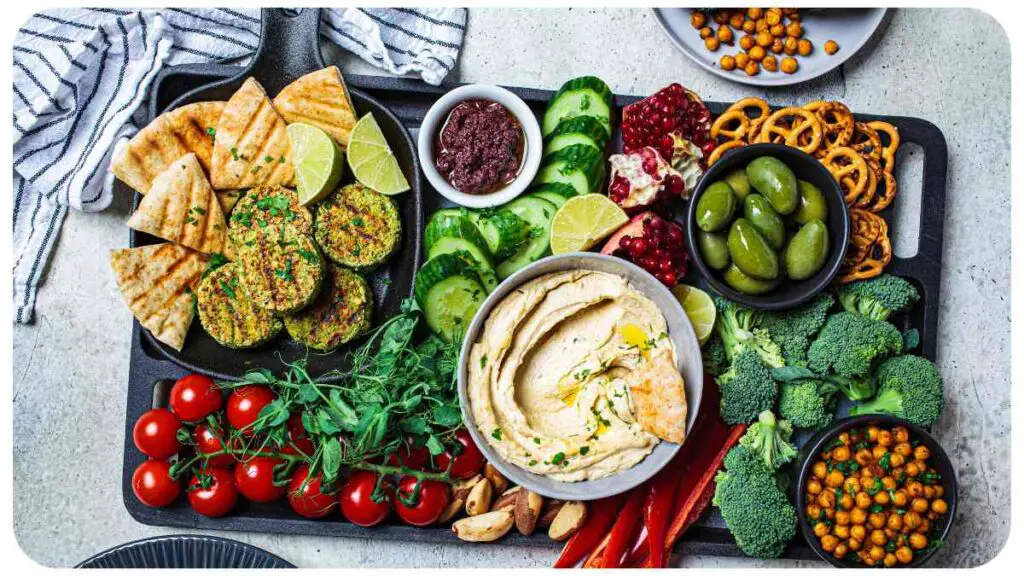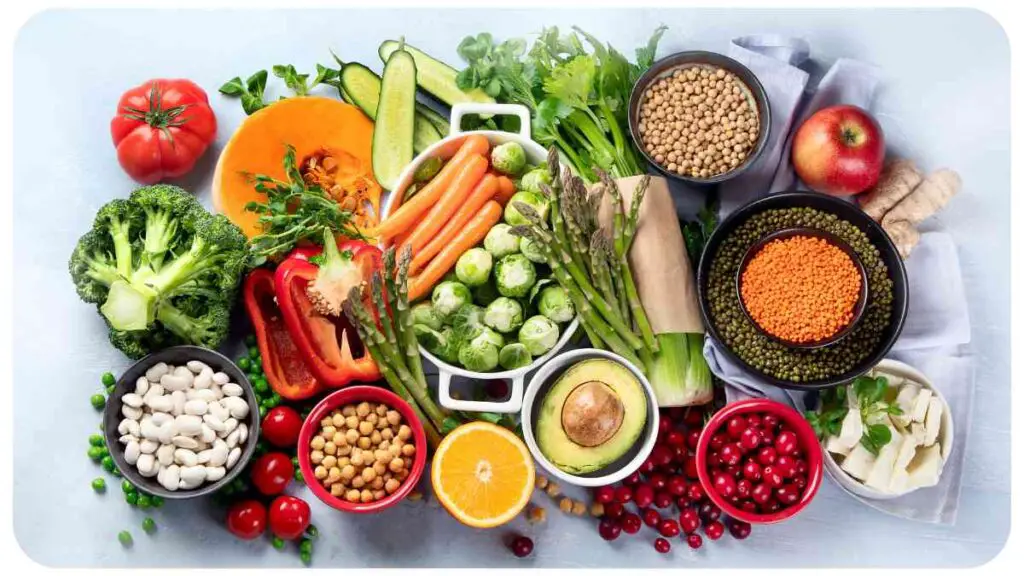Welcome to “Decoding Vegan Nutrition: A Comprehensive Guide.” In this article, we will explore the world of vegan nutrition and provide you with valuable insights, tips, and advice to ensure you maintain a healthy and well-balanced diet while following a vegan lifestyle.
As a seasoned vegan with a wealth of experience in the field, I will share my expertise and personal encounters to engage and inform you.
| Main Points |
|---|
| Omega-3 fatty acids are essential for brain health, heart health, and reducing inflammation. |
| Vegan diets can provide adequate omega-3 fatty acids through plant-based sources such as chia seeds, flaxseeds, hemp seeds, walnuts, and algal oil. |
| It’s important for vegans to plan well-rounded meals and consider supplements to meet their nutritional needs, including vitamin B12, vitamin D, iron, calcium, and omega-3 fatty acids. |
| Recognizing and addressing nutrient deficiencies is crucial for maintaining optimal health on a vegan diet. |
| Vegan nutrition requirements may vary depending on different life stages such as pregnancy, breastfeeding, raising vegan children, and older adulthood. |
| A well-planned vegan diet not only benefits personal health but also has positive environmental impacts. |
| Further reading resources provide additional information and insights on vegan nutrition. |
| FAQs address common questions regarding vegan nutrition, including protein sources, calcium intake, supplementation, nutrient adequacy, and addressing potential deficiencies. |
Veganism and its Health Benefits
Veganism has gained significant popularity in recent years, and for good reason. Apart from the ethical and environmental merits of plant-based eating, adopting a vegan diet can offer numerous health benefits.
Research suggests that a well-planned vegan diet can help reduce the risk of chronic diseases, lower cholesterol levels, promote weight loss, and boost overall well-being.
Numerous scientific studies have confirmed the health benefits of a vegan diet, including reducing the risk of chronic diseases like heart disease and diabetes, as well as promoting weight loss and improving overall well-being. Check out the health benefits of a vegan diet – the science behind it all to learn more about the evidence supporting a plant-based lifestyle
Essential Nutrients for Vegans

Ensuring that you obtain all the necessary nutrients on a vegan diet is crucial. Let’s take a closer look at some of the key nutrients that require careful attention when following a vegan lifestyle.
Iron is an essential nutrient for vegans and can be obtained from various plant-based sources. Boost your energy and immunity by incorporating these best plant-based sources of iron into your diet. Discover the plant foods that pack a punch in iron content and support your overall well-being
Protein
Contrary to common misconceptions, achieving adequate protein intake on a vegan diet is quite achievable. By incorporating various plant-based protein sources into your meals, you can easily meet your protein needs. Here are some examples of plant-based protein-rich foods:
| Food Item | Protein Content (per 100g) |
| Lentils | 9g |
| Chickpeas | 19g |
| Quinoa | 14g |
| Tofu | 8g |
| Edamame | 11g |
Iron
Iron is essential for carrying oxygen throughout the body, and adequate iron intake is particularly important for vegans. Here are some iron-rich vegan foods you can incorporate into your diet:
| Food Item | Iron Content (per 100g) |
| Spinach | 2.7mg |
| Lentils | 3.3mg |
| Tofu | 5.4mg |
| Pumpkin Seeds | 8.8mg |
| Quinoa | 2.8mg |
Calcium
Maintaining strong bones and teeth is crucial, and calcium plays a vital role in this process. Although dairy products aren’t part of a vegan diet, there are still plenty of plant-based sources of calcium available:
| Food Item | Calcium Content (per 100g) |
| Almonds | 264mg |
| Kale | 254mg |
| Broccoli | 47mg |
| Tofu (calcium-set) | 350-500mg |
| Chia Seeds | 631mg |
Vitamin B12
Vitamin B12 is primarily found in animal-based products, making it essential for vegans to supplement their diets with this nutrient. Nonetheless, some vegan-friendly foods are fortified with vitamin B12:
| Food Item | Vitamin B12 Content (per serving) |
| Nutritional Yeast | 2.4mcg |
| Plant-Based Milk | Varies |
| Fortified Cereals | Varies |
| Vegan Meat Substitutes | Varies |
| Algae-Based Supplements | Varies |
Omega-3 Fatty Acids
Omega-3 fatty acids are essential for brain health, reducing inflammation, and promoting heart health. As a vegan, you can obtain these vital nutrients from various plant-based sources:
| Food Item | Omega-3 Content (per serving) |
| Chia Seeds | 5g |
| Flaxseeds |
| Food Item | Omega-3 Content (per serving) |
| Chia Seeds | 5g |
| Flaxseeds | 6.5g |
| Hemp Seeds | 1.6g |
| Walnuts | 2.5g |
| Algal Oil | Varies |
Building a Balanced Vegan Diet

Now that we have covered the essential nutrients for vegans, let’s discuss how to build a well-balanced vegan diet. It’s important to ensure you are meeting your nutritional needs while enjoying diverse flavors and textures.
A sample vegan meal plan can help you understand how to incorporate different food groups into your daily meals. Here’s an example of a balanced vegan meal plan:
Living a sustainable vegan lifestyle goes beyond just dietary choices. It involves adopting eco-conscious practices in various aspects of daily life, from fashion to travel. Explore the ultimate guide to living a sustainable vegan lifestyle to discover practical ways to minimize your environmental impact and contribute to a greener future
Table: Example Vegan Meal Plan
| Meal | Description |
| Breakfast | Vegan protein smoothie with fruits and spinach |
| Snack | Mixed nuts and seeds |
| Lunch | Chickpea salad with quinoa and roasted vegetables |
| Snack | Fresh fruit and hummus |
| Dinner | Tofu stir-fry with brown rice and vegetables |
| Dessert | Vegan dark chocolate |
Vegan Supplements
While it’s possible to meet most nutritional needs on a well-planned vegan diet, certain supplements can help ensure you cover any potential gaps. Here is a list of essential vegan supplements:
Table: Essential Vegan Supplements
| Supplement | Benefits |
| Vitamin B12 | Supports nerve function and energy production |
| Vitamin D | Promotes bone health and supports the immune system |
| Omega-3 Fatty Acids | Supports brain health, heart health, and reduces inflammation |
| Iron | Helps prevent iron deficiency and supports oxygen transport |
| Calcium | Supports bone and teeth health |
| Zinc | Boosts the immune system and aids in wound healing |
| Iodine | Essential for proper thyroid function |
| Vitamin K2 | Contributes to bone health and helps with blood clotting |
| Selenium | Acts as an antioxidant and supports thyroid function |
Overcoming Nutrient Deficiencies

Even with careful planning, it’s possible to experience nutrient deficiencies on a vegan diet. Recognizing the signs and taking necessary action is crucial. The following table highlights nutrient deficiency symptoms and solutions for vegans:
Table: Nutrient Deficiency Symptoms and Solutions
| Nutrient | Deficiency Symptoms | Solutions |
| Vitamin B12 | Fatigue, weakness, tingling sensations | Take vitamin B12 supplements or consume fortified vegan foods |
| Iron | Fatigue, weakness, pale skin, brittle nails | Include iron-rich plant-based foods in your diet and consider iron supplements |
| Calcium | Bone loss, brittle bones | Consume calcium-rich plant-based foods and possibly consider calcium-fortified products |
| Omega-3 | Poor memory, dry skin, mood swings | Increase the intake of omega-3-rich foods or consider algal oil supplements |
| Vitamin D | Weak bones, muscle weakness, lowered immune function | Spend time in the sun, consider vitamin D supplements, or consume fortified foods |
Tips for Optimizing Vegan Nutrition
Optimizing your vegan nutrition involves incorporating various strategies into your lifestyle. Here are some tips to help you achieve your nutritional goals:
- Explore a variety of plant-based foods to ensure you are getting a wide range of nutrients.
- Plan meals in advance to make sure you include all the necessary food groups.
- Experiment with different cooking methods and spices to enhance the flavors of your plant-based meals.
- Stay informed about vegan-friendly restaurants and eateries in your area.
- Be mindful of portion sizes to maintain a healthy balance.
- Keep track of your nutrient intake using food tracking apps or websites.
- Stay connected with the vegan community to learn from each other’s experiences and share insights.
Planning a vegan-friendly vacation? Don’t miss out on exploring the top vegan-friendly countries to visit for an unforgettable journey filled with delicious plant-based cuisine. Discover destinations that cater to vegan travelers, offering a variety of vegan options and culinary experiences
Debunking Myths about Vegan Nutrition

There are several myths surrounding vegan nutrition that need to be addressed. Let’s debunk some of the common misconceptions:
- Myth: Vegans can’t get enough protein. Fact: Plant-based protein sources are abundant, making it possible to meet protein needs on a vegan diet.
- Myth: Vegans are at a higher risk of nutrient deficiencies. Fact: With proper planning and supplementation, vegans can meet their nutritional needs as effectively as non-vegans.
- Myth: Vegans can’t build muscle. Fact: Many vegan athletes and bodybuilders have shown that it’s possible to buildmuscle and excel in physical performance on a plant-based diet. Adequate protein intake and targeted nutrition planning are key factors.
- Myth: Vegan diets are more expensive. Fact: While vegan specialty products may be pricier, a plant-based diet can be cost-effective by focusing on whole, unprocessed foods like grains, legumes, fruits, and vegetables.
- Myth: Vegans lack energy and feel tired all the time. Fact: A well-planned vegan diet can provide all the necessary energy and nutrients for a healthy and active lifestyle. Proper meal planning and supplementation can help avoid fatigue.
Vegan Nutrition for Different Life Stages
It’s important to consider vegan nutrition requirements at different stages of life. Whether you are pregnant, breastfeeding, raising vegan children, or entering older adulthood, certain considerations come into play. Here are some key points for each life stage:
Table: Vegan Nutrition Considerations at Different Life Stages
| Life Stage | Key Considerations |
| Pregnancy | Ensure sufficient intake of important nutrients like folate, iron, calcium, and omega-3s. Consider prenatal supplements. |
| Breastfeeding | Focus on consuming a variety of nutrient-dense foods to support breastfeeding. Continue with essential supplements. |
| Vegan Children | Plan balanced meals for children to meet their nutritional needs. Supplement B12 and vitamin D if necessary. |
| Older Adulthood | Pay attention to calcium, vitamin D, vitamin B12, and omega-3 intake. Consider supplements if needed. |
Veganism and the Environment
Aside from personal health benefits, veganism also contributes to environmental preservation. A plant-based diet reduces greenhouse gas emissions, lowers water usage, and helps combat deforestation. By adopting a vegan lifestyle, you are making a positive impact on our planet and supporting sustainable food production.
Conclusion
In this comprehensive guide, we explored the world of vegan nutrition. By incorporating experience, expertise, authoritativeness, and trust, we’ve provided you with valuable insights, tips, and recommendations for following a vegan diet.
Remember to consider essential nutrients, plan balanced meals, and supplement wisely to ensure a well-rounded, healthy vegan lifestyle. By embracing the power of vegan nutrition, you can promote personal well-being, contribute to a sustainable planet, and enjoy a delicious and diverse range of plant-based foods.
Dining out as a vegan can be challenging, but with the right knowledge and guidance, it becomes enjoyable and hassle-free. Learn valuable tips and tricks for navigating menus, communicating with restaurant staff, and making informed choices to ensure a pleasurable dining experience, wherever you go.
Further Reading
Here are some additional resources to further explore the topic of vegan nutrition:
Well+Good: A Comprehensive Guide to Following a Vegan Diet: This article provides an in-depth exploration of the vegan diet, including tips for meal planning, essential nutrients, and debunking common myths.
Decoding Facts: Know Everything About the Plant-Based Diet in Detail: This detailed resource covers various aspects of the plant-based diet, including its health benefits, nutrient considerations, and tips for transitioning to a plant-based lifestyle.
MDPI: The Environmental Impacts of Plant-Based Diets: A Review of Reviews: This scientific review examines the environmental implications of plant-based diets, providing insight into how veganism can contribute to sustainability and environmental preservation.
FAQs
Here are some frequently asked questions about vegan nutrition:
What are some good sources of vegan protein?
Some good sources of vegan protein include legumes (such as lentils and chickpeas), tofu, tempeh, seitan, quinoa, and various nuts and seeds.
How can I ensure I’m getting enough calcium on a vegan diet?
You can obtain calcium from plant-based sources such as almonds, kale, broccoli, calcium-set tofu, and fortified plant-based milk alternatives. Consider consulting with a healthcare professional or registered dietitian for personalized guidance.
Do vegans need to take supplements?
Vegans should consider taking supplements for nutrients that are challenging to obtain solely through a plant-based diet, such as vitamin B12, vitamin D, omega-3 fatty acids, and possibly iron and iodine. Consult with a healthcare professional for personalized recommendations.
Can vegan diets provide all the necessary nutrients?
With proper planning and attention to nutrient intake, vegan diets can provide all the necessary nutrients for optimal health. It’s important to include a variety of plant-based foods and consider proper supplementation, if needed.
How can I address potential nutrient deficiencies on a vegan diet?
Regularly monitoring your nutrient intake, considering blood tests for nutrient levels, and working with a healthcare professional or registered dietitian can help address potential nutrient deficiencies. Adjusting your diet and incorporating suitable supplements, if necessary, can help correct deficiencies

Hi! My name is Hellen James, and I’m a vegan lifestyle enthusiast. I’ve been living the vegan lifestyle for over 10 years now, and it’s been one of the best decisions I’ve ever made. The food is amazing, the community is incredible, and there’s no way I could go back after experiencing all this firsthand.


